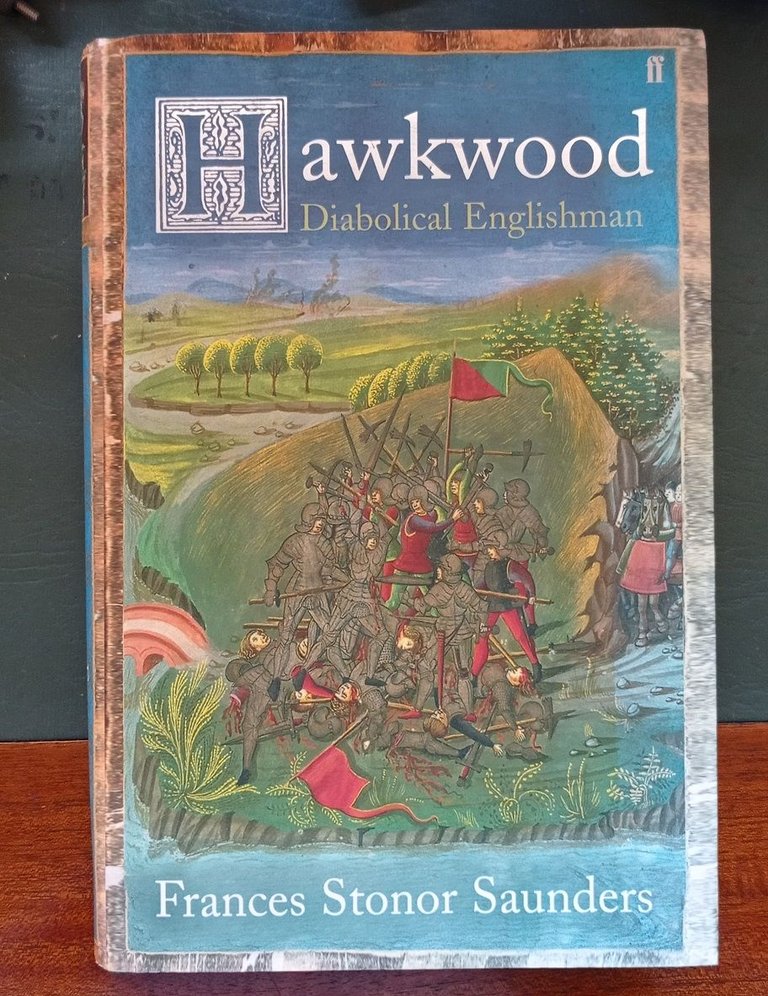Book Review - Hawkwood, Diabolical Englishman - by Frances Stonor Saunders
Hollywood loves to cast Englishmen as villains. It amazes me that they haven't made a film about John Hawkwood, who fits the stereotype very well in so many ways. The reality, of course, was a lot more nuanced, and this book reflects that.
John Hawkwood was an English mercenary captain who fought in Italy from 1351 until his death there in 1394. He made and lost fortunes, and became a key figure in the incredibly complex politics of medieval Italy.

Photo by me, of my copy of the book

This book traces John Hawkwood's long career in detail, and does a good job of both explaining the web of rivalries between the various cities as well as interfering outside parties, and the way English mercenaries and Hawkwood capitalised on it. It also has a fascinating introductory chapter setting the stage, outlining the situation in Western Europe in the late 14th Century and what life was like.
I won't try to precis the text of the book - that would probably make this a 30-minute post just trying to explain medieval Italian politics and the many twists and turns of Hawkwood's career.
Suffice to say that he was a master of his craft. He didn't always win his battles, but he was successful enough that for two or three decades cities would empty their treasuries to pay him off rather than risk the devastation of his raids.
At the time, Italian cities focused on making money. It took them a long time to realise that hiring mercenaries to supplement poorly trained and equipped militias was a poor alternative to building up their own professional armies. It didn't help that mercenaries were fighting for money, not to risk their lives, and would happily change sides (or extort coin from both sides) if the pay or prospects were better.
Something I hadn't realised before was how involved the English crown was in Italian affairs. Hawkwood's career mostly spanned a lull in the Hundred Years' War, when English soldiers made themselves available for hire as a way to make ends meet until fighting resumed (as everyone seems to have assumed it would !) But despite nominal peace between England and France, both were looking to find advantages over the other, and Italy was a key area under contention. Hawkwood was an important player in this, being seen sometimes as a kind of representative for English interests, and meeting with Geoffrey Chaucer on more than one occasion.
It's unclear whether Hawkwood was ever formally knighted; he started as an ordinary lad from Essex and fought alongside the Black Prince at Poitiers, where he may or may not have been knighted. But was always given the title in Italy out of respect for his position as a condottiere captain. By the end of his career, he seems to have been transformed from a ruthless robber to a respected defender of Florence, and his statue is still there in the Duomo.
The book is written in a highly readable style, and the author has clearly dedicated a lot of research and thought into weaving a coherent narrative of events about an incredibly complex and chaotic time. She gives due weight to the other important and often flamboyant personalities of the era, and ensures you have the background information needed to understand how each chapter fits into the overall narrative.
If there is one thing I would recommend it is to read the book a chapter or two at a time. It's not the kind of bedtime reading where you can just flip through a couple of pages and nod off ! It might be worth having a notepad handy so you can map out which rivalries come into play at any particular time.
This is definitely a worthwhile book about a part of medieval history that is little known - too late for the Crusades and Crecy, too early for Agincourt or the Wars of the Roses, but very much laying the foundations for the Italian Renaissance.

Published 2004 by Faber & Faber, 365 pages with 33 plates. ISBN 0-571-21908-X
To be honest I never realized the intricate web of politics and power during the Hundred Years' War. It's interesting how individuals like John Hawkwood shaped history with their ambition and cunning. Great insights dear friend.. keep it coming
Thank you ! The problem with Medieval history is that it's taught very superficially in schools (if at all) and then attractive to Hollywood who delight on re-writing it or fitting it to whatever agenda is in fashion at the time. But the reality is fascinating and just as complex as modern politics - in fact, much of modern politics can trace it's roots back to the factional conflicts of the Late Medieval period.
You're absolutely right, come to think of it a lot of what we see in modern politics is very connected to the medieval times.. I'm glad you read your post